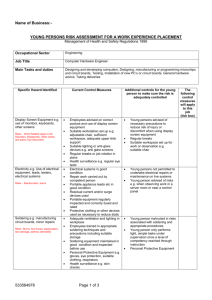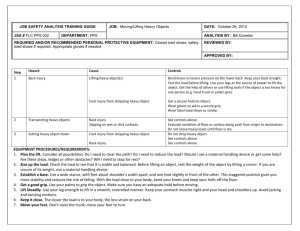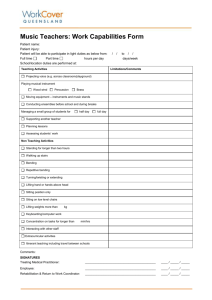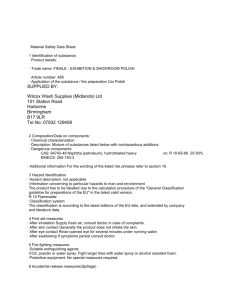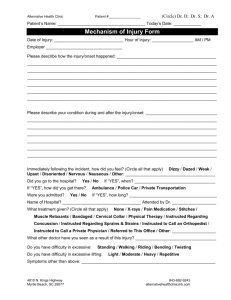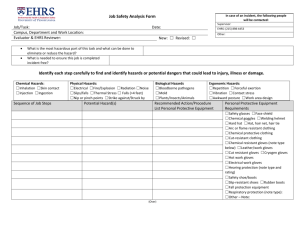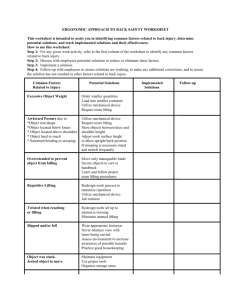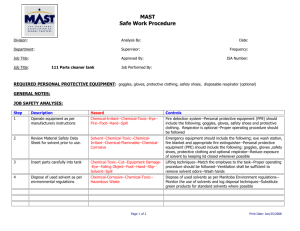Dental Nurse
advertisement
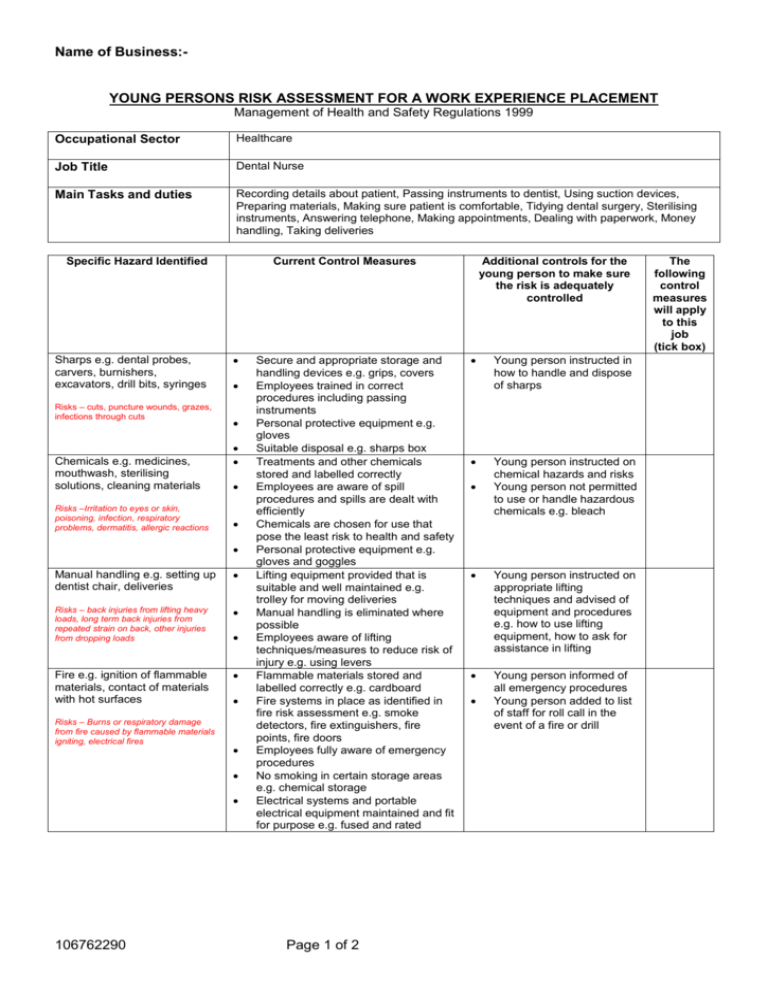
Name of Business:- YOUNG PERSONS RISK ASSESSMENT FOR A WORK EXPERIENCE PLACEMENT Management of Health and Safety Regulations 1999 Occupational Sector Healthcare Job Title Dental Nurse Main Tasks and duties Recording details about patient, Passing instruments to dentist, Using suction devices, Preparing materials, Making sure patient is comfortable, Tidying dental surgery, Sterilising instruments, Answering telephone, Making appointments, Dealing with paperwork, Money handling, Taking deliveries Specific Hazard Identified Sharps e.g. dental probes, carvers, burnishers, excavators, drill bits, syringes Risks – cuts, puncture wounds, grazes, infections through cuts Chemicals e.g. medicines, mouthwash, sterilising solutions, cleaning materials Risks –Irritation to eyes or skin, poisoning, infection, respiratory problems, dermatitis, allergic reactions Current Control Measures Manual handling e.g. setting up dentist chair, deliveries Risks – back injuries from lifting heavy loads, long term back injuries from repeated strain on back, other injuries from dropping loads Fire e.g. ignition of flammable materials, contact of materials with hot surfaces Risks – Burns or respiratory damage from fire caused by flammable materials igniting, electrical fires 106762290 Secure and appropriate storage and handling devices e.g. grips, covers Employees trained in correct procedures including passing instruments Personal protective equipment e.g. gloves Suitable disposal e.g. sharps box Treatments and other chemicals stored and labelled correctly Employees are aware of spill procedures and spills are dealt with efficiently Chemicals are chosen for use that pose the least risk to health and safety Personal protective equipment e.g. gloves and goggles Lifting equipment provided that is suitable and well maintained e.g. trolley for moving deliveries Manual handling is eliminated where possible Employees aware of lifting techniques/measures to reduce risk of injury e.g. using levers Flammable materials stored and labelled correctly e.g. cardboard Fire systems in place as identified in fire risk assessment e.g. smoke detectors, fire extinguishers, fire points, fire doors Employees fully aware of emergency procedures No smoking in certain storage areas e.g. chemical storage Electrical systems and portable electrical equipment maintained and fit for purpose e.g. fused and rated Page 1 of 2 Additional controls for the young person to make sure the risk is adequately controlled Young person instructed in how to handle and dispose of sharps Young person instructed on chemical hazards and risks Young person not permitted to use or handle hazardous chemicals e.g. bleach Young person instructed on appropriate lifting techniques and advised of equipment and procedures e.g. how to use lifting equipment, how to ask for assistance in lifting Young person informed of all emergency procedures Young person added to list of staff for roll call in the event of a fire or drill The following control measures will apply to this job (tick box) Workplace conditions e.g. lighting, ventilation, temperature, floor Risks – Slips, trips and falls resulting in fractures, bruises, grazes or cuts from contact with sharp edges, respiratory difficulties, dehydration Radiation e.g. X-rays Risks – Over-exposure to X-rays Display screen equipment e.g. entering patient details, updating patient records, making appointments Risks – Work Related Upper Limb Disorders, Headaches, Other aches and pains, Eye discomfort Electricity e.g. drills, lights, autoclave Risks – Electrocution, burns Heat e.g. autoclave or other sterilising equipment Risks – Burns, scalds, skin damage Biological agents e.g. direct contact with clients, infection through cuts or abrasions, loss of oils to skin Risks – skin infections, blood transmitted infections Workplace is generally clean and tidy Adequate lighting, heating and ventilation is provided Workplace and fittings are well maintained Young person advised on housekeeping procedures Appropriate shielding in place X-ray only taken where necessary and nurse only used to assist where necessary otherwise kept away from room Employees instructed on appropriate precautions Employees advised on correct posture and use of display screen equipment Suitable workstation set up e.g. adjustable chair, sufficient workspace, adequate upper limb support Suitable lighting or anti-glare devices e.g. anti glare screens Regular breaks or job rotation in place Health surveillance e.g. regular eye tests Electrical systems in good condition Repair work carried out by competent person Portable appliance leads etc in good condition Portable equipment regularly inspected and correctly fused and rated Employees are suitable trained and competent in use of equipment Insulated and fire retardant handles and surfaces Retrieval equipment provided e.g. long handled tongs, handles Warnings on hot surfaces e.g. warning signs, lights Personal protective equipment e.g. gloves Employees trained in appropriate hygiene and risks of biological agents so can inform doctor should symptoms occur Restriction on treatment of clients with certain infections e.g. infectious skin complaints Hygienic practices and procedures in place e.g. correct waste disposal Toilet and canteen facilities available Personal protective equipment e.g. gloves Young persons segregated from X-ray activities completely Young persons advised of necessary precautions to reduce risk of injury or discomfort when using display screen equipment Regular breaks Suitable workspace set up for work or observation e.g. suitable chair Young persons not permitted to undertake electrical repairs or maintenance on live systems Young person advised of risks e.g. on observing use of specialised equipment Young person is aware of hot surfaces and other areas where excessive heat is an issue Personal protective equipment e.g. gloves Young person instructed on appropriate hygiene measures Young person given advice on risks of biological agents and symptoms Young persons segregated from clients with infectious conditions Young persons risk assessment completed by:- __________________________ Date:- ________ Name of student:- ___________________________________________________________________ Copy of risk assessment sent to:- ______________________________________ A copy of the risk assessment will be sent to the students via the school/college 106762290 Page 2 of 2 Date:- ________
